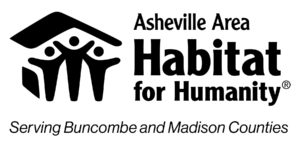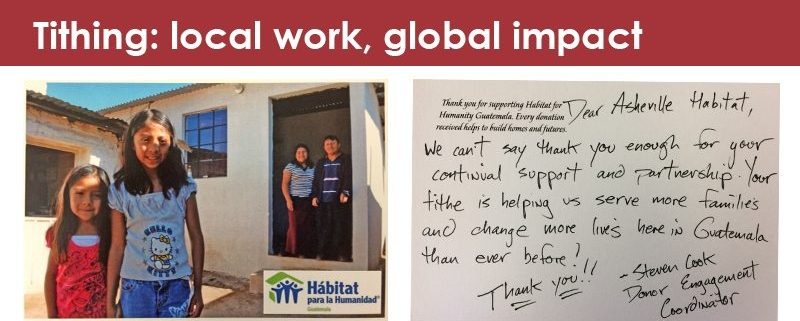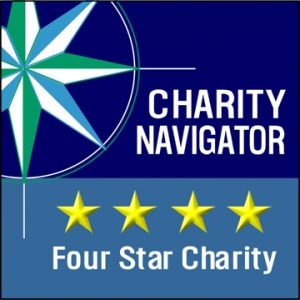Tithing Update: August 2016
From the beginning, Habitat for Humanity’s work has been global in scope, and the tithing of funds by U.S. affiliates has and continues to play a significant role in Habitat’s global impact. Tithing through Habitat for Humanity International ensures that funding reaches the countries that have both a Habitat presence and some of the greatest need.
Over the past thirty years, Asheville Area Habitat for Humanity has tithed nearly $650,000 to Habitat affiliates around the world, serving 182 international families. Each time we close a house in Buncombe County, we tithe. In 2016 alone, $45,000 was tithed to five partner countries, as well as to a new Orphans and Vulnerable Groups (OVG) Fund.
Susan Weltner Yow, Habitat for Humanity International’s Director of Affiliate Tithe and Global Engagement, recently visited our affiliate and shared updates from the countries we support through our tithe. And we are happy to be able to share those updates with you here.
Each country’s focus is different as urgent needs vary by region. In Guatemala, the focus continues to be building new homes, though they are steadily increasing the number of smokeless stove and water filtration projects that they complete as well. By 2017, HFH Guatemala will be building its 75,000 house! Asheville Area Habitat volunteers have participated in seven service trips to Guatemala in the past eight years.
In a nation populated heavily by orphans (from AIDS) and where children-headed households are common, Malawi needs clean water, as well as sanitation and hygiene systems. A healthy environment refers to more than just a healthy home, so Habitat Malawi is boring holes for community water taps and engaging the community in sanitation and hygiene education.
The largest tithe recipient of all Habitat affiliates, Haiti remains focused on rebuilding communities since the devastating earthquake of 2010. Haiti is the poorest country in the Western Hemisphere, and land tenure remains the biggest roadblock to rebuilding there. Habitat Haiti is committed to working with the community to do repairs, retrofits and reconstruction of damaged or unsafe homes, as well as community development work and advocacy. With a newly formed Habitat Resource Center, they are also trying to lend technical assistance, create capital markets, and support incremental building processes.
The poorest non-African country in the world, and one of the most populated, Bangladesh is focused on implementing housing, water, sanitation and hygiene projects. John A. Armstrong, National Director of Habitat Bangladesh, is quick to note, “We could not operate without the support of U.S. affiliates and their tithes.”
Egypt was one of the first countries to start serving the poorest of the poor. They are focused on rehabbing existing home and providing hygiene education. An interesting phenomenon that was noted, and has since been addressed, is that because livestock is the valuable asset a person has, Egyptians were putting their livestock in their new or newly rehabbed homes, and the humans were sleeping in dilapidated and unsanitary sheds and barns. Habitat now builds sheds for the animals, in addition to building homes for the families.
Habitat for Humanity’s newer Orphans and Vulnerable Groups Fund does exactly what the name suggests; it supports the world’s most vulnerable people. In Fiscal Year 2015, the OVG funds were distributed to HFH Malawi. Funds tithed in FY16 will be used in Ivory Coast, Bangladesh, and Zambia.
As you can see, the impact of Asheville Area Habitat for Humanity extends far beyond the borders of Buncombe County. In our community and around the world, we are building and improving places to call home.




